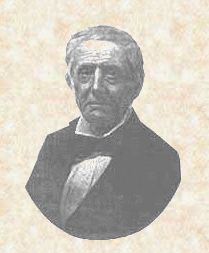 A faithful member of Dry Creek Baptist Church in Kenton County, northern Kentucky, as well as a founding member (1855) of Florence Baptist Church (and remaining a member until his death in 1873), Leonard Stephens (illustration) is a longtime Baptist.
A faithful member of Dry Creek Baptist Church in Kenton County, northern Kentucky, as well as a founding member (1855) of Florence Baptist Church (and remaining a member until his death in 1873), Leonard Stephens (illustration) is a longtime Baptist.
Born in Virginia in 1791, Leonard’s parents migrated to the northern Kentucky frontier, where the family settled down and established deep roots. By now, Leonard is also an experienced politician, having served multiple terms in the Kentucky House and Senate, as well as having held local positions of magistrate and sheriff.
Today Stephens pens a letter to his brother William, now living in Missouri, and includes a few observations about the Civil War, a conflict that many now realize will not end soon. Kentucky as a state remains neutral during the war, and Stephens’ feels free to speak his mind:
The accounts we gather from the newspapers now is that the United States are only now beginning to realize the extent of rebellion, & that the preparations now making will be amply sufficient to crush out the last vestiges with the next few months. If this be so, & surely the papers know whereof they affirm, would it not be far better for the South to submit without the further effusion of blood. Is it not a great pity for this great nation to be weakened or reduced by intestine wars until other nations will probably step in & make us dependents of them. Surely if the object here has been to make a display of bravery enough of that has already been done, & as the South has to be subdued, would it not be in their interest to sue for peace, before being vanquished. For while they have their armies in the field & make a shew of fight they could perhaps make more favorable terms than when reduced, or disarmed.
You & I my Brother have had no thing to do with the bringing on of this war, But we are certain to have a good deal to do with its consequences, for if it lasts much longer our Great Grand children will be taxed all their lives to pay its expenses. Does it not behoove every man then that has influence to endevour to induce the Southern States to return to their allegiance as loyal Citizens. Please give me your views candidly in regard to this whole matter, & if we differ or if you do not agree with me, we will still be Brothers & have the same affectionate feelings for each other as we have always done. Contrary to what we expected in the Spring our State has become involved in the Clash of arms, & there are already a number of thousands of troops in Ky. The United States fources are already sufficient to repel & drive out the Confederate troops that are now here, & it is said that a large additional fource is on the way & will be in CinCinnnati within a few days. Thirty thousand are for Ky, & thirty thousand for your State. I suppose one reason we did not have neutrality in KY is that the President believed the South or a Portion of it could be more readily won by marching troops through our State, & the Union men here being largely in the majority were desirous to assist in crushing out rebellion, & they are now doubtless flocking to the United States Standard by large quantities. It was thought for a while now that there might be some fighting in Ky, but the probability now is there will be none as the Confederate troops that had come into our State had commenced retreating, & will soon pass beyond our limits. Every thing is so deranged at present that I can give little or no information in regard to prices for our staples. We are feeding about two hundred hogs, but I have no idea as to what we shall be able to get for them. Our corn crop is short, not an average by I think at least one fourth & perhaps a third. Will you please present me affectionately to all your children & Grandchildren. Let me hear from you soon as this is rece’d as I am very desirous to do so. I am my Dear Brother, yours affectionately till death. May God bless you, Leonard Stephens
Stephens’ words of warning prove somewhat prescient. During the war, economic hardships plague the South, while for years following the war, the South’s economy remains in tatters.
Source: Leonard Stephens’ letters (link) and biography (link)
Special thanks to Jim Duvall of BaptistHistoryHomePage.Com for bringing Leonard Stephens to my attention.


